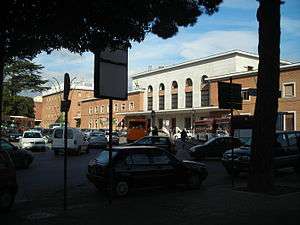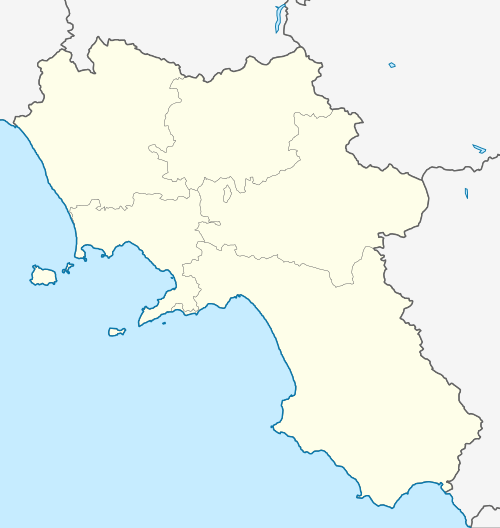Benevento railway station
Benevento | |
|---|---|
 View of the passenger building. | |
| Location |
Piazza Vittoria Colonna 82100 Benevento BN Benevento, Benevento, Campania Italy |
| Coordinates | 41°08′31″N 14°46′11″E / 41.14194°N 14.76972°ECoordinates: 41°08′31″N 14°46′11″E / 41.14194°N 14.76972°E |
| Operated by |
Rete Ferroviaria Italiana Centostazioni |
| Line(s) |
Naples–Foggia Benevento–Campobasso Cancello–Benevento Benevento–Cancello (EAV) |
| Distance | 100.859 km (62.671 mi) from Foggia |
| Train operators | Trenitalia |
| Connections |
|
| Other information | |
| Classification | Gold |
| History | |
| Opened | 18 April 1868 |
| Location | |
 Benevento Location within Campania | |
Benevento railway station (Italian: Stazione di Benevento) is the main station serving the city and comune of Benevento, in the region of Campania, southern Italy. Opened in 1868, it forms part of the Naples–Foggia railway, and is also a terminus of three secondary railways, linking Benevento with Campobasso, Avellino, and Cancello, respectively.
The station is currently managed by Rete Ferroviaria Italiana (RFI). However, the commercial area of the passenger building is managed by Centostazioni. Train services on all lines other than the Cancello line are operated by Trenitalia. Each of these companies is a subsidiary of Ferrovie dello Stato (FS), Italy's state-owned rail company.
Train services on the Cancello line are operated by Ente Autonomo Volturno,[1] which is owned by the Consorzio UnicoCampania[2] group.
Location
Benevento railway station is situated at Piazza Vittoria Colonna, northwest of the city centre.
History
The station was opened on 18 April 1868, upon the inauguration of the Casalduni–Benevento section of the Naples–Foggia railway.[3]
On 1 August 1868, the station became a through station, when the next section of the Naples–Foggia railway was completed, between Benevento and Montecalvo Irpino.[3] Over the years, several other lines converged on the station.
During its life, the station has undergone several changes, such as the construction of a new passenger building, and the restructuring of its underpasses. At the start of 2007, it was completely automated.
Features
The current passenger building is a two-storey structure that was built during the late 1960s. It is formed of a central section featuring five large arched windows, and two lateral wings. At ground floor level, there are services for passengers, while the first floor houses Trenitalia offices. There is also an office of the railway police.
In the station yard, there are five through tracks used for passenger services. The station yard also has three platforms equipped with shelters and joined via a pedestrian underpass. Additionally, there are some dock platforms for terminating trains to and from Naples.
The station also has a goods yard with several tracks, and a locomotive shed for diesel locomotives.
Train services
The station has about 800,000 passenger movements each year.[4] In recent years, the number of passenger movements has fallen appreciably, due to poor patronage on some of the converging lines.
All passenger trains passing through the station stop there, including Eurostar Italia and InterCity trains.
The station is also the terminus of regional trains to and from Campobasso, Caserta, Salerno, Napoli Centrale, Avellino and Foggia.
The station is served by the following services (incomplete):
- High speed services (Eurostar Frecciargento) Rome - Foggia - Bari - Brindisi - Lecce
- Intercity services Rome - Foggia - Bari (- Taranto)
- Night train (Intercity Night) Rome - Foggia - Bari - Brindisi - Lecce
| Preceding station | Trenitalia | Following station | ||
|---|---|---|---|---|
toward Roma Termini | Frecciargento | toward Lecce |
||
toward Roma Termini | InterCity | Ariano Irpino toward Taranto |
||
Telese-Cerreto toward Roma Termini | InterCity | Ariano Irpino toward Bari Centrale |
||
toward Roma Termini | Intercity Notte | toward Lecce |
Interchange
The station has a city bus terminal for buses operated by AMTS, the local bus service.
See also
- History of rail transport in Italy
- List of railway stations in Campania
- Rail transport in Italy
- Railway stations in Italy
References
- ↑ it:MetroCampania NordEst
- ↑ it:Consorzio UnicoCampania
- 1 2 Alessandro Tuzza; et al. "Prospetto cronologico dei tratti di ferrovia aperti all'esercizio dal 1839 al 31 dicembre 1926" [Chronological overview of the features of the railways opened between 1839 and 31 December 1926]. Trenidicarta.it (in Italian). Alessandro Tuzza. Retrieved 1 January 2011.
- ↑ "Flussi Annui nelle 103 Stazioni" [Annual flows at the 103 stations]. Centostazioni website (in Italian). Centostazioni. Archived from the original on 9 February 2010. Retrieved 4 December 2010.
External links
![]() Media related to Benevento railway station at Wikimedia Commons
Media related to Benevento railway station at Wikimedia Commons
This article is based upon a translation of the Italian language version as at January 2011.
